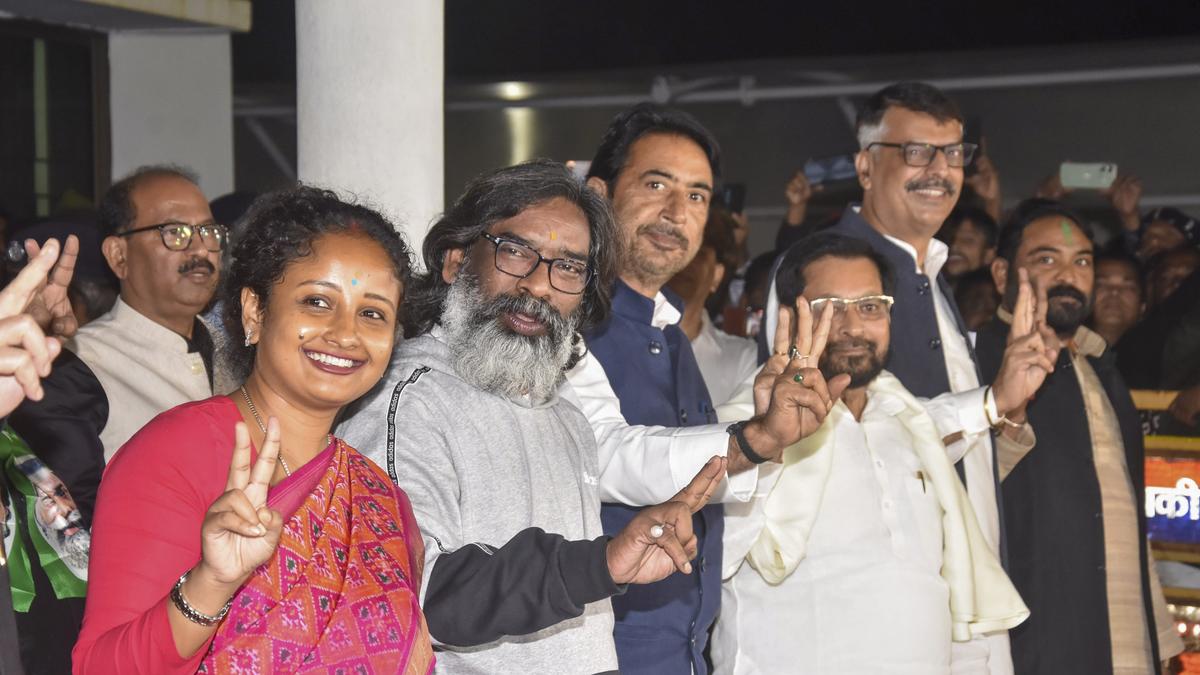 |
|
The recent Jharkhand Assembly elections resulted in a resounding victory for the Jharkhand Mukti Morcha (JMM)-led INDIA bloc, led by Chief Minister Hemant Soren. Securing 56 out of 81 seats, the alliance achieved its best electoral performance to date and marked the first time a single leadership has retained power consecutively in the state's history. This decisive win stands in stark contrast to the National Democratic Alliance (NDA), which secured only 24 seats – a significant decrease from its previous performance. The JMM itself won 34 seats, while Congress garnered 16, RJD 4, and CPI(ML) Liberation 2. Within the NDA, the BJP won 21 seats, with its allies, AJSU, LJP(RV), and JD(U), each winning a single seat.
The BJP's campaign, despite significant resources and the involvement of high-profile leaders including Prime Minister Narendra Modi and Union Home Minister Amit Shah, along with six Chief Ministers from BJP-ruled states, Defence Minister Rajnath Singh, and BJP president J.P. Nadda, ultimately failed to resonate with the electorate. Their focus on issues such as 'infiltration by Bangladeshis', corruption allegations, and demographic changes in the Santal Pargana region appeared to backfire. The BJP's slogans, such as “Batenge to katenge” (divided, we will be destroyed) and “Ek hai to safe hai” (united, we are safe), also proved unsuccessful. This strategic misstep contributed to the party's humiliating defeat, failing to capitalize on the anti-incumbency sentiment they hoped to leverage.
In contrast, the JMM’s campaign proved far more effective. Hemant Soren's 'Maiya Samman Yojana', a cash transfer scheme providing ₹1,000 per month, played a crucial role in attracting women voters. This financial support, particularly the timely distribution of four installments before the election, undoubtedly swayed a significant portion of the electorate towards the INDIA bloc. The JMM also successfully capitalized on the narrative surrounding Soren's arrest and imprisonment by the Enforcement Directorate on money laundering charges. Framing this as political harassment, the party effectively played the ‘victim card’, turning public sympathy into electoral gains. The arrest also seemingly mitigated any significant anti-incumbency sentiment.
The JMM’s strong support base amongst tribal and Muslim communities remained crucial to its victory. These groups, considered the party's biggest vote banks, contributed to the JMM's impressive nearly 24% vote share. The BJP’s attempts to exploit internal divisions within the JMM, such as the defection of Shibu Soren’s daughter-in-law Sita Soren and Champai Soren to the BJP, also backfired. These moves, instead of weakening the JMM, seemed to strengthen Hemant Soren's resolve and solidify the tribal voters' support around his leadership, viewing it as an attempt to break apart the party. The proactive role played by Hemant Soren's wife, Kalpana Soren, after her husband's arrest, further boosted the party’s campaign. Her extensive campaigning and engagement with women voters proved particularly successful.
The election results also highlighted significant setbacks for other political players. The AJSU, which contested 10 seats, lost 9, including its president Sudhesh Mahto. The emergence of the Jharkhand Loktantrik Krantikari Morcha (JLKM), led by Jairam Tiger Mahto, further disrupted the political landscape, winning the Dumri seat and acting as a spoiler for the AJSU. Several prominent figures lost the election, including the Leader of the Opposition Amar Kumar Bauri, Champai Soren's son Babulal Soren, Sita Soren, and the wives of two former Chief Ministers, Geetha Koda and Meera Munda. The outcome underscores a significant shift in Jharkhand's political dynamics, with the JMM-led INDIA bloc establishing a strong mandate for the next term and the BJP facing a major challenge in its strategies and messaging in the tribal-dominated state.
The election's outcome provides several valuable lessons for political strategists. The effective use of targeted social welfare programs, the ability to manage and capitalize on negative narratives against the incumbent party, and a strong mobilization strategy within core voter bases have all contributed to JMM's success. The BJP, despite its significant campaign resources, failed to connect effectively with the electorate. The lesson appears to be that understanding the nuances of local contexts, prioritizing relevant issues, and fostering genuine connections with the voter base are ultimately more important than extensive campaigns and high-profile figures. The Jharkhand election has certainly reshaped the political map of the state and offers valuable insights for future electoral battles across India.
